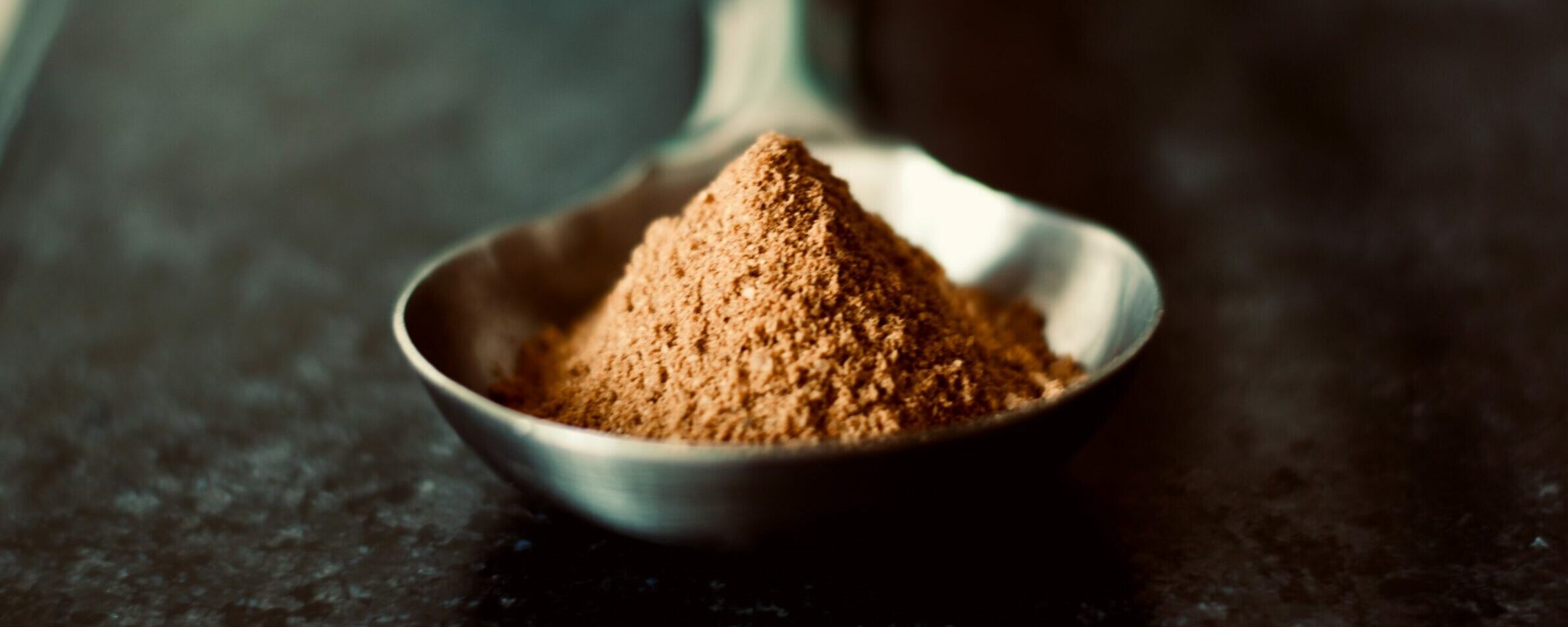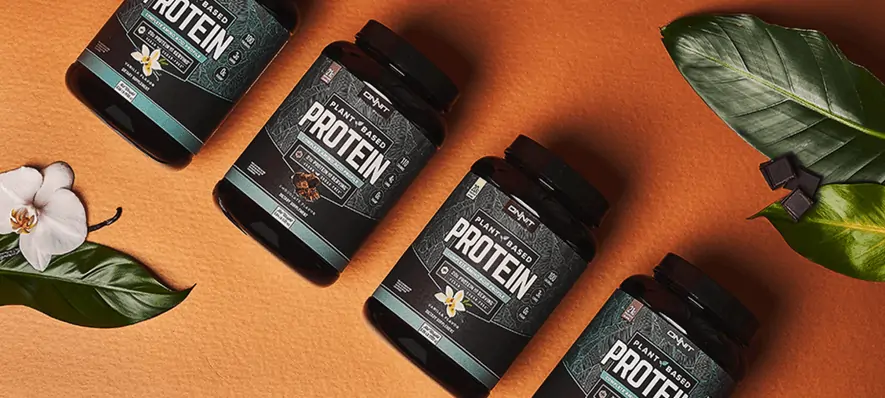
When you’re faced with a wall of protein powder options, decision fatigue becomes all too real. How do you choose between so many options? And, more specifically, how do you choose a powder that will actually encourage muscle growth, vs. just adding more calories?
Since there are virtually endless amounts of different powders out there, I’m breaking down here which are the best in terms of quality, what to look for, and how to chose a protein powder for your gains goals.
First Things First: Not All Protein Powders Are Created Equal
This fact goes much, much deeper than the difference between protein derived from animals vs. protein derived from plants (although this is a major point I cover below!). From additional ingredients to the way each type of protein is extracted and processed, there are several factors to consider before jumping the gun on a protein based on, say, flavor.
Quality of Ingredients (Plus Added Ingredients). We’re covering this first, since this will eliminate many commercial powders on the market and make narrowing down your perfect protein much easier, whether you’re plant based or not. Most powders – and especially the flavored types – are filled with added sugars, artificial flavorings, preservatives, food colorings, thickeners, and other synthetics that are counterproductive to overall health, and may irritate your gut. Below is an example of the type of ingredients you want to avoid in your protein powders:
Sugar, sucralose, splenda (955), aspartamine, equal, NutraSweet (951), or saccharin (954), milk solids, skim milk, Artificial Flavors, Acesulfame Potassium, Lactase, corn syrup solids, high-fructose corn syrup, sorbitol, maltitol, soy protein, gluten
This is by far an extensive list, but the general rule is: if you can’t pronounce it or don’t recognize it as a whole, natural food source, it’s probably best avoided.
Some protein powders will also include added supplements, such as creatine, extra BCAAs (branched-chain amino acids), omega-3 and 6 fatty acids, digestive enzymes, and probiotics to assist with digestion and as a value add-on. As long as these are pure additions, there is no harm in choosing a powder with these.
Third-Party Certifications. Many protein powders have been found to be contaminated with toxins such as heavy metals, and/or their labels don’t match with the ingredient list. This is why it’s extremely valuable to look for certifications of purity from third-party testers, such as NSF International’s Certified for Sport, and USP.
Processing. In general, you will see isolates, concentrates, and protein hydrolysates when you check ingredient labels of protein powders. The exception for this is plant-based whole-food powders, which typically list the whole-food source, such as “hemp protein powder.”
Isolates tend to contain a bit less fat and carbohydrates than concentrates, which will typically make their calorie count slightly lower. Hydrolysates receive extra processing so that they are more easily digested and absorbed, which can be a great choice if you’re having digestive issues. And finally, concentrates can have a higher percentage of carbohydrates and fats (as well as calories) than isolates or hydrolysates, but this is only a concern if the calorie, carb, and fat count is significantly higher than the other versions. This doesn’t make them a lower quality, just something to be mindful of!
Plant Based vs. Animal Protein
Overall, protein powders have improved substantially over the years (especially plant based versions). Regardless of whether you’re using an animal-based or plant-based, there are several aspects to consider before purchasing either!
However, before we dive into individual options, the most important thing to keep in mind for both is amino acid profile.
All in all, your body uses 20 different amino acids. Seven of these are non-essential amino acids (your body can create these on its own), four are conditionally essential amino acids (you body can make these sometimes, but only under certain conditions), and nine that are known as essential amino acids (EAAs). Your body can’t make these, so you have to get them from food.
A complete protein contains sufficient amounts of all nine EAAs, which is the goal whether you’re looking for an animal-based powder or plant-based powder. It’s typically much easier to get a complete protein from animal-based proteins, but a plant-based powder with several different plant protein sources expertly blended can provide a complete protein!
Whey and Other Animal-Based Protein
Whey is usually the recommended go-to protein powder for post-workout, since it has been found to be the most efficiently absorbed and contain the highest amount of branched-chain amino acids (BCAA’s), which are substrates of essential amino acids we spoke of earlier. It scores the highest on digestibility, and provided it is free from artificial ingredients, is one of the best milk-based powders to choose. I personally use Onnit’s Whey Protein below, which is free from gluten, soy, and other synthetics, and contains a full range of BCAAs, making it extremely high quality and perfect for supporting growth.
Get 10% OFF Onnit Whey Protein Using My Code: PRIMAL:
Other animal-based proteins include casein, which is another decent choice, although can be irritating to the gut for some (especially those sensitive to dairy). You’ll also see things like bone broth and collagen powders, which while excellent additions to your diet for various reasons like to improve joint health, haven’t been studied as well as whey and other powders, and some sources even claim they aren’t complete proteins.
Plant-Based Protein: What to Look For
The most important thing to look for in a plant-based protein powder is a robust amino acid profile. This is why blends are your best bet when you enter this arena, because it ensures you are getting the same essential amino acid profile as whey and other animal-based protein powders! As long as the blend is formulated correctly (which a good manufacturer will have everything broken down for you, including the protein and amino acid ratios) there is no reason to assume plant-based protein powders are less effective than their traditional counterparts.
You ingredient list here can include a mix of isolates, concentrates, and whole-food proteins, such as pea protein concentrate, brown rice protein, sunflower seed protein, pumpkin seed protein, etc.
This is why I also love Onnit’s Plant-Based Protein Powder, as it contains the same standard of high-quality ingredients and all nine essential amino acids as whey protein.
Get 10% OFF Onnit Plant Based Protein Using My Code: PRIMAL:
The Best Protein Powder For Gains
Now that the bases are covered for what you should avoid in a protein, let’s grapple with what to look for for making gains. In general, look for a protein powder with a high protein-to-calorie ratio, as the main goal is to consume adequate overall protein. Plus, consider powders that are high in protein, carbohydrates, and fat, and this can help facilitate overall growth.
How much protein to take for muscle gain. First, remember that a protein powder is not designed to replace the majority of your protein intake from whole-food sources of protein, carbs, and fat. It is simply meant to add supplemental amino acids to facilitate greater growth. This is why sticking to 1-2 scoops (20-40 grams) per day from your protein power is ideal, while you consume the rest of your macros and calories from whole foods.
How to take protein powder for weight loss. Ideally, you’ll want to consume your protein after your workout to shuttle in the extra amino acids to your muscles to encourage repair and growth. You can mix powder with non-dairy milk and carry it with you, or blend it up in a smoothie with other ingredients as well. If you’re looking for intense weight gain, try making larger smoothies with added carbs and fats like bananas and almond butter.
The Bottom Line

• Make sure your protein powder is free from synthetic ingredients and sweeteners, which are harmful to health
• The best protein powder for gains will contain protein, carbs, and healthy fats.
• Make sure any protein powder provides all essential amino acids
• Protein powders are designed to supplement a whole-food based diet, not to replace several meals

